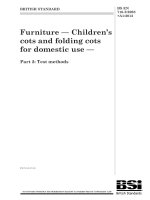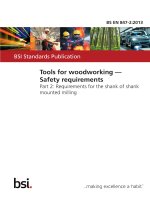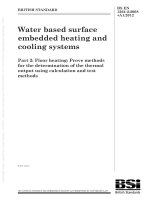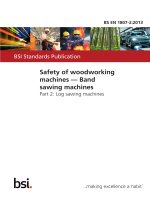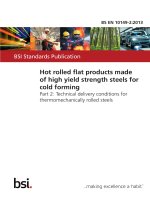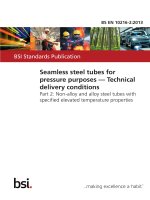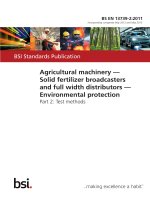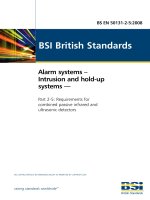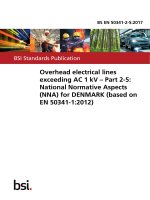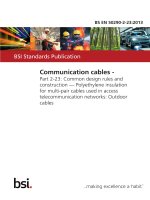Bsi bs en 61326 2 5 2013
Bạn đang xem bản rút gọn của tài liệu. Xem và tải ngay bản đầy đủ của tài liệu tại đây (1.09 MB, 22 trang )
BS EN 61326-2-5:2013
BSI Standards Publication
Electrical equipment for
measurement, control
and laboratory use —
EMC requirements
Part 2-5: Particular requirements —
Test configurations, operational conditions
and performance criteria for devices with
field bus interfaces according to
IEC 61784-1 (IEC 61326-2-5:2012)
BRITISH STANDARD
BS EN 61326-2-5:2013
National foreword
This British Standard is the UK implementation of EN 61326-2-5:2013.
It is identical to IEC 61326-2-5:2012. It supersedes BS EN 61326-2-5:2006,
which will be withdrawn on 6 November 2015.
The UK participation in its preparation was entrusted by Technical Committee
GEL/65, Measurement and control, to Subcommittee GEL/65/1,
System considerations.
A list of organizations represented on this committee can be obtained on
request to its secretary.
This publication does not purport to include all the necessary provisions of a
contract. Users are responsible for its correct application.
© The British Standards Institution 2013.
Published by BSI Standards Limited 2013.
ISBN 978 0 580 70409 3
ICS 25.040.40; 33.100.01
Compliance with a British Standard cannot confer immunity
from legal obligations.
This British Standard was published under the authority of the
Standards Policy and Strategy Committee on 28 February 2013.
Amendments issued since publication
Amd. No.
Date
Text affected
BS EN 61326-2-5:2013
EN 61326-2-5
EUROPEAN STANDARD
NORME EUROPÉENNE
EUROPÄISCHE NORM
January 2013
ICS 17.220; 25.040.40; 33.100
Supersedes EN 61326-2-5:2006
English version
Electrical equipment for measurement, control and laboratory use EMC requirements Part 2-5: Particular requirements Test configurations, operational conditions and performance criteria for
devices with field bus interfaces according to IEC 61784-1
(IEC 61326-2-5:2012)
Matériel électrique de mesure, de
commande et de laboratoire Exigences relatives à la CEM Partie 2-4: Exigences particulières Configurations d'essai, conditions de
fonctionnement et critères d'aptitude à la
fonction pour les appareils en exploitation
avec des interfaces utilisant des bus de
terrain conformes à la CEI 61784-1
(CEI 61326-2-5:2012)
Elektrische Mess-, Steuer-, Regel- und
Laborgeräte – EMV-Anforderungen – Teil
2-5: Besondere Anforderungen –
Prüfanordnungen, Betriebsbedingungen
und Leistungsmerkmale für Feldgeräte mit
Feldbus-Schnittstellen gemäß IEC 617841
(IEC 61326-2-5:2012)
This European Standard was approved by CENELEC on 2012-11-06. CENELEC members are bound to comply
with the CEN/CENELEC Internal Regulations which stipulate the conditions for giving this European Standard
the status of a national standard without any alteration.
Up-to-date lists and bibliographical references concerning such national standards may be obtained on
application to the CEN-CENELEC Management Centre or to any CENELEC member.
This European Standard exists in three official versions (English, French, German). A version in any other
language made by translation under the responsibility of a CENELEC member into its own language and notified
to the CEN-CENELEC Management Centre has the same status as the official versions.
CENELEC members are the national electrotechnical committees of Austria, Belgium, Bulgaria, Croatia, Cyprus,
the Czech Republic, Denmark, Estonia, Finland, Former Yugoslav Republic of Macedonia, France, Germany,
Greece, Hungary, Iceland, Ireland, Italy, Latvia, Lithuania, Luxembourg, Malta, the Netherlands, Norway, Poland,
Portugal, Romania, Slovakia, Slovenia, Spain, Sweden, Switzerland, Turkey and the United Kingdom.
CENELEC
European Committee for Electrotechnical Standardization
Comité Européen de Normalisation Electrotechnique
Europäisches Komitee für Elektrotechnische Normung
Management Centre: Avenue Marnix 17, B - 1000 Brussels
© 2013 CENELEC -
All rights of exploitation in any form and by any means reserved worldwide for CENELEC members.
Ref. No. EN 61326-2-5:2013 E
BS EN 61326-2-5:2013
EN 61326-2-5:2013
Foreword
The text of document 65A/643/FDIS, future edition 2 of IEC 61326-2-5, prepared by SC 65A, "System
aspects", of IEC TC 65, "Industrial-process measurement, control and automation" was submitted to the
IEC-CENELEC parallel vote and approved by CENELEC as EN 61326-2-5:2013.
The following dates are fixed:
•
•
latest date by which the document has
to be implemented at national level by
publication of an identical national
standard or by endorsement
latest date by which the national
standards conflicting with the
document have to be withdrawn
(dop)
2013-08-06
(dow)
2015-11-06
This document supersedes EN 61326-2-5:2006.
EN 61326-2-5:2013 includes the following significant technical changes with respect to EN 61326-25:2006:
– Update with respect to EN 61326-1:2013.
EN 61326-2-5:2013 is to be used in conjunction with EN 61326-1:2013 and follows the same numbering
of clauses, subclauses, tables and figures.
When a particular subclause of EN 61326-1 is not mentioned in this part, that subclause applies as far as
is reasonable. When this standard states “addition”, “modification” or “replacement”, the relevant text in
EN 61326-1 is to be adapted accordingly.
NOTE The following numbering system is used:
– subclauses, tables and figures that are numbered starting from 101 are additional to those in EN 61326-1;
– unless notes are in a new subclause or involve notes in EN 61326-1, they are numbered starting from 101 including
those in a replaced clause or subclause;
– additional annexes are lettered AA, BB, etc.
Attention is drawn to the possibility that some of the elements of this document may be the subject of
patent rights. CENELEC [and/or CEN] shall not be held responsible for identifying any or all such patent
rights.
This document has been prepared under a mandate given to CENELEC by the European Commission
and the European Free Trade Association, and supports essential requirements of EU Directive(s).
For the relationship with EU Directive(s) see informative Annex ZZ, which is an integral part of this
document.
Endorsement notice
The text of the International Standard IEC 61326-2-5:2012 was approved by CENELEC as a European
Standard without any modification.
BS EN 61326-2-5:2013
EN 61326-2-5:2013
Annex ZA
(normative)
Normative references to international publications
with their corresponding European publications
The following documents, in whole or in part, are normatively referenced in this document and are
indispensable for its application. For dated references, only the edition cited applies. For undated
references, the latest edition of the referenced document (including any amendments) applies.
NOTE When an international publication has been modified by common modifications, indicated by (mod), the relevant EN/HD
applies.
Annex ZA of EN 61326-1:2013 applies, except as follows:
Publication
Year
Title
EN/HD
Year
IEC 61158-2
2010
Industrial communication networks - Fieldbus EN 61158-2
specifications Part 2: Physical layer specification and service
definition
2010
IEC 61158-3-3
2007
Industrial communication networks - Fieldbus EN 61158-3-3
specifications Part 3-3: Data-link layer service definition Type 3 elements
2008
IEC 61158-5-5
2007
Industrial communication networks - Fieldbus EN 61158-5-5
specifications Part 5-5: Application layer service definition Type 5 elements
2008
IEC 61158-6-10
2010
Industrial communication networks - Fieldbus EN 61158-6-10
specifications Part 6-10: Application layer protocol
specification - Type 10 elements
2012
IEC 61784-1
2010
Industrial communication networks - Profiles - EN 61784-1
Part 1: Fieldbus profiles
2010
Addition:
BS EN 61326-2-5:2013
EN 61326-2-5:2013
Annex ZZ
(informative)
Coverage of Essential Requirements of EU Directives
This European Standard has been prepared under a mandate given to CENELEC by the European
Commission and the European Free Trade Association and within its scope the standard covers
protection requirements of Annex I, Article 1 of the EC Directive 2004/108/EC.
Compliance with this standard provides one means of conformity with the specified essential
requirements of the Directive[s] concerned.
NOTE
Other requirements and other EU Directives may be applicable to the products falling within the scope of
this standard.
BS EN 61326-2-5:2013
61326-2-5 © IEC:2012
CONTENTS
1
Scope . ............................................................................................................................................. 5
2
Normative references . .................................................................................................................. 5
3
Terms and definitions . .................................................................................................................. 6
4
General . .......................................................................................................................................... 6
5
EMC test plan ................................................................................................................................. 6
6
5.1 General ................................................................................................................................. 6
5.2 Configuration of EUT during testing . ................................................................................ 6
5.3 Operation conditions of EUT during testing . .................................................................... 6
5.4 Specification of functional performance ........................................................................... 6
5.5 Test description . .................................................................................................................. 6
Immunity requirements . ................................................................................................................ 6
7
6.1 Conditions during the tests . ............................................................................................... 6
6.2 Immunity test requirements . .............................................................................................. 6
6.3 Random aspects. ................................................................................................................. 6
6.4 Performance criteria . .......................................................................................................... 7
Emission requirements . ................................................................................................................ 7
8
Test results and test report . ......................................................................................................... 7
9
Instructions for use ........................................................................................................................ 7
Annex AA (normative) Particular requirements – Test configurations, operational
conditions and performance criteria for field devices with field bus interfaces according
to IEC 61784-1 CP 1/1 . ........................................................................................................................ 8
Annex BB (normative) Particular requirements – Test configurations, operational
conditions and performance criteria for field devices with field bus interfaces according
to IEC 61784-1 CP 3/2 ....................................................................................................................... 13
Figure AA.1 – Test set up for EUT with CP 1/1 interface . ............................................................ 10
Figure BB.1 – Test set up for EUT with CP 3/2 interface . ............................................................ 15
BS EN 61326-2-5:2013
61326-2-5 © IEC:2012
–5–
ELECTRICAL EQUIPMENT FOR MEASUREMENT,
CONTROL AND LABORATORY USE –
EMC REQUIREMENTS –
Part 2-5: Particular requirements –
Test configurations, operational conditions and performance criteria
for field devices with field bus interfaces according to IEC 61784-1
1
Scope
In addition to the requirements of International Standard IEC 61326-1, this part of IEC 61326
treats the particular features for EMC testing of field devices with field bus interfaces. This
part of IEC 61326 covers only the field bus interface of the equipment.
NOTE
The other functions of the equipment remain covered by other parts of IEC 61326 series.
This part refers only to field devices intended for use in process control and process
measuring.
In this standard field devices with interfaces according to IEC 61784-1, CP 3/2 and CP 1/1 as
defined in IEC 61784 are covered. Other field busses may be included in future editions of
this standard.
The IEC 61784-1 specifies a set of protocol specific communication profiles based on
IEC 61158.
The manufacturer specifies the environment for which the product is intended to be used
and/or selects the appropriate test level specifications of IEC 61326-1.
2
Normative references
The following documents, in whole or in part, are normatively referenced in this document and
are indispensable for its application. For dated references, only the edition cited applies. For
undated references, the latest edition of the referenced document (including any
amendments) applies.
Clause 2 of IEC 61326-1 applies except as follows:
Addition:
IEC 61158-2:2010, Industrial communication networks – Fieldbus specifications – Part 2:
Physical layer specification and service definition
IEC 61158-3-3:2007, Industrial communication networks – Fieldbus specifications – Part 3-3:
Data-link layer service definition – Type 3 elements
IEC 61158-5-5:2007, Industrial communication networks – Fieldbus specifications – Part 5-5:
Application layer service definition – Type 5 elements
IEC 61158-6-10:2010, Industrial communication networks – Fieldbus specifications – Part 610: Application layer protocol specification – Type 10 elements
–6–
BS EN 61326-2-5:2013
61326-2-5 © IEC:2012
IEC 61784-1:2010, Industrial communication networks – Profiles – Part 1: Fieldbus profiles
3
Terms and definitions
Clause 3 of IEC 61326-1 applies.
4
General
Clause 4 of IEC 61326-1 applies.
5
5.1
EMC test plan
General
Subclause 5.1 of IEC 61326-1 applies.
5.2
Configuration of EUT during testing
Subclause 5.2 of IEC 61326-1 applies, except as follows:
Addition:
Additional requirements: see Annexes AA and BB.
5.3
Operation conditions of EUT during testing
Subclause 5.3 of IEC 61326-1 applies, except as follows:
Addition:
Additional requirements: see Annexes AA and BB.
5.4
Specification of functional performance
Subclause 5.4 of IEC 61326-1 applies.
5.5
Test description
Subclause 5.5 of IEC 61326-1 applies.
6
6.1
Immunity requirements
Conditions during the tests
Subclause 6.1 of IEC 61326-1 applies.
6.2
Immunity test requirements
Subclause 6.2 of IEC 61326-1 applies.
6.3
Random aspects
Subclause 6.3 of IEC 61326-1 applies.
BS EN 61326-2-5:2013
61326-2-5 © IEC:2012
6.4
–7–
Performance criteria
Subclause 6.4 of IEC 61326-1 applies, except as follows:
Addition:
Additional requirements: see Annexes AA and BB.
7
Emission requirements
Clause 7 of IEC 61326-1 applies.
8
Test results and test report
Clause 8 of IEC 61326-1 applies, except as follows:
Addition:
The type of shield connection at the EUT shall be stated in the test report.
9
Instructions for use
Clause 9 of IEC 61326-1 applies.
–8–
BS EN 61326-2-5:2013
61326-2-5 © IEC:2012
Annex AA
(normative)
Particular requirements –
Test configurations, operational conditions and performance criteria for
field devices with field bus interfaces according to IEC 61784-1 CP 1/1
AA.1 General
In connection with the main part of this standard, this Annex AA describes specific test
configurations, operational conditions and performance criteria regarding the field bus
interface using the communication profile CP 1/1 according to IEC 61784-1.
To prevent confusion with requirements of other annexes, the equipment under test (EUT) is
called “EUT with CP 1/1 interface” throughout this annex.
AA.2 EMC test plan
AA.2.1
Configuration of EUT with CP 1/1 interface during testing
Subclause 5.2 of IEC 61326-1 applies, except as follows:
Addition:
AA.2.1.1
Test configuration for EUT with CP 1/1 interface
In order to assign any malfunction of the communication during the EMC-test to the EUT with
CP 1/1 interface, the configuration of field devices with interfaces according to IEC 61784-1,
CP 1/1 shall be limited to the operation of one host system and one EUT with CP 1/1 interface
during EMC type tests.
Ports other than I/O ports covered by this part of the standard are tested according to
IEC 61326-1.
The connection plan is shown in Figure AA.1.
The field device is connected via a device coupler with the power conditioner and the host
system.
A standardised field bus terminator is attached at the third port of the device coupler.
The EUT with CP 1/1 interface, power conditioner, host system, device coupler(s) and
terminator are connected by means of a standard type A field bus cable (foil shield, foil
shield/mesh). Armoured cables or cables in conduit are not allowed for EMC testing.
Except for the connection at the EUT with CP 1/1 interface itself (see AA.2.1.3), the shield
shall be connected at any individual component by a low-impedance grounding strip
(connection between shield and the case with a large surface).
The individual cable lengths L1, L2, L3, L5 and L6 originate from a practice-adjusted set up,
preferred as given in Figure AA.1.
BS EN 61326-2-5:2013
61326-2-5 © IEC:2012
–9–
The cable length L4 should be 8 m ± 1 m, in case that the respective basic standards do not
specify other lengths. The cable installation shall be in accordance with the appropriate basic
standard.
The connection of the shield at the shield grounding point may be produced by partially
removing the insulation of the cable shield and fixing the cable shield with a metal clamp or by
means of conductive leading-in-conductors such as a metallic cable gland at the ground plane
or at the shielding metal wall respectively.
The location and execution of the shield grounding point depend on the given test facility, e.g.
by use of an anechoic chamber or a shielded cabin it is the metal wall penetration; and with
tests on tables with ground plane the shield grounding point is on the ground plane.
AA.2.1.2
Connection cable for EUT with CP 1/1 interface
A standard bus cable type A shall be used as communication cable (see IEC 61158–2:2010,
12.8.2). The cable lengths L1 to L4, are given in Figure AA.1 and additional requirement for
L4 is described in AA.2.1.1. The lengths of L5 and L6 are not specified and depend on the
installed equipment.
AA.2.1.3
Connections at the EUT with CP 1/1 interface
The grounding of the EUT with CP 1/1 interface shall be in accordance with the
manufacturer’s specification.
The shield of the cable shall be connected in the most sensitive method (for example with the
shield not connected at the EUT with CP 1/1 interface) if not otherwise specified by the
manufacturer.
NOTE If the manufacturer specifies the shield shall be connected at the EUT with CP 1/1 interface, the EUT with
CP 1/1 interface shall be tested in accordance with the manufacturer’s specification.
AA.2.1.4
Field bus network
The field bus network shall include the terminator of the bus, device coupler(s), the host
system and the EUT with CP 1/1 interface. For bus-powered devices the field bus network
includes additionally the power conditioner and the power supply. The evaluation and
conditioning of the data in the host system are not the object of this part of the standard. The
device coupler(s) and the bus terminator are passive components only.
BS EN 61326-2-5:2013
61326-2-5 © IEC:2012
– 10 –
7
C
G
L5
T
4
2
L2
L1
E1
L6
A
E2
2
T
2
L3
3
2a
2
1
L4
D
5
6
B
2a
IEC 1838/12
A: Host system
1: Shield grounding point (SGP) of L4
B: Field device (EUT with CP 1/1 interface)
2: Shield / housing connected with low impedance
C: Power conditioner (5 mH+50 Ω)
2a: Enclosure connected with low impedance
D: EMC test place
3: Cable from device coupler(s) to SGP
E1, E2: device coupler(s)
4: Terminator, either direct at device coupler or after a
short cable (< 1 m)
T: Bus terminator
5: Cable from SGP to field device
G: Power supply
6: Connection of shield at field device see AA.2.1.3
L1: 8 m cable type A
7: A, C, G, E1 and T may be included in a single
housing / system / device
L2: 2 m cable type A
L3: 2 m cable type A
L4: 8 m cable type A (see AA.2.1.2)
L5, L6: cable type A (see AA.2.1.2)
Figure AA.1 – Test set up for EUT with CP 1/1 interface
AA.2.2
Operation conditions of EUT with CP 1/1 interface during testing
Subclause 5.3 of IEC 61326-1 applies, except as follows:
Addition:
BS EN 61326-2-5:2013
61326-2-5 © IEC:2012
AA.2.2.1
– 11 –
Operational conditions for EUT with CP 1/1 interface
a) The macrocyle of the field bus segment should be as short as possible to have as often as
possible communication on the bus and to have fast reaction of the system.
b) For a transmitter type device there shall be a Publisher Subscriber communication
relationship for each process value and its status (e.g. output parameter of AI or DI) that
the EUT with CP 1/1 interface offers. The EUT with CP 1/1 interface has the role
‘Publisher’.
c) For a receiver type device there shall be:
–
a Publisher Subscriber communication relationship for each setpoint/input value and its
status (e.g. input parameter of AO or DO) that the EUT with CP 1/1 interface accepts;
in this/these relationship(s) the EUT with CP 1/1 interface has the role ‘Subscriber’;
–
and a Publisher Subscriber communication relationship for each output value and its
status (e.g. BKCAL_OUT/BKCAL_OUT_D) that the EUT with CP 1/1 interface offers; in
this/these relationship(s) the EUT with CP 1/1 interface has the role ‘Publisher’.
d) The “Stale Count Limit” has to be set to 2.
In cases where the “Stale count Limit” is not adjustable the value (not equal to 2) shall be
stated in the test report.
e) The frequency of client-server communication has to be set to one service request (e.g.
read request) every other macrocyle.
AA.2.2.2
Status for EUT with CP 1/1 interface
The host system monitors the received data of the EUT with CP 1/1 interface. The received
data is of the data type QualifiedFloat32 or QualifiedUnsigned8 as defined in
IEC 61158-5-5:2007, 5.3.3.12 resp. 5.3.3.13. Those data types are of the format
STRUCTURE and have a field named status.
For the automation system and the test evaluation the quality in the status is significant.
In case of received data only four qualities can appear (extract from IEC 61158-6-10:2010,
5.1.1.3.2.2):
–
"Good (Cascade)"
means status is in the range between 192 and 255
–
"Good (Non Cascade)"
means status is in the range between 128 and 191
–
"Uncertain"
means status is in the range between 64 and 127
–
"Bad"
means status is in the range between 0 and 63
The equipment under test shall preferably be configured so that the value of the status is 128
or greater during normal operation without EMC disturbance.
Other values for the status are allowed if they enable the evaluation the function of the EUT
with CP 1/1 interface. However values of the status indicating a disturbed communication
shall be avoided. If a status value deviating from 128 is chosen the reasons for this decision
have to be reported in the test report.
AA.2.2.3
Monitoring for EUT with CP 1/1 interface
a) For transmitter type device:
The process value(s) and its status shall be monitored.
The requirements for Pass / Fail the EMC test with regard to the value(s) are given in the
specification of the manufacturer or in an appropriate part of this IEC 61326 standard
series.
b) For receiver type device (Positioner, Displays):
The output value (e.g. BKCAL_OUT/BKCAL_OUT_D) and its status shall be monitored.
For devices like positioner or valves or displays: Visual confirmation is required. The
– 12 –
BS EN 61326-2-5:2013
61326-2-5 © IEC:2012
requirements for Pass / Fail the EMC test with regard to the value(s) are given in the
specification of the manufacturer or in an appropriate part of this IEC 61326 standard
series.
c) The number of consecutive non-responses of the client-server communications shall be
counted. Any count more than 2 consecutive non-responses shall be considered as a
communication failure.
d) Any overrun of the stale counter shall be considered as a failure.
AA.3 Performance criteria
Subclause 6.4 of IEC 61326-1 applies, except as follows:
Performance criterion A is extended by the following:
Performance criteria A
No communication failures are detected (see AA.2.2.3). The status value chosen
according to AA.2.2.2 shall remain unchanged during and after the test (see AA.2.2.2
and AA.2.2.3).
Performance criterion B is extended by the following:
Performance criteria B
The status value (see AA.2.2.2 and AA.2.2.3) deviates during the test, but returns to
normal afterwards and/or communication failure is detected but after test the device
returns with no operator intervention to the expected operational state.
Performance criterion C is extended by the following:
Performance criteria C
The status value (see AA.2.2.2 and AA.2.2.3) deviates during the test, and/or
communication failures are detected, but after test the device only returns with
operator intervention to the intended operation mode.
AA.4 Information on the host system
The host system includes the following functionality:
a) Configures the communication relationships as described in AA.2.2.1
b) Monitors the communication, it detects / counts communication errors and violation of
status values as described in AA.2.2.3.
c) Initiates the communication in Client Server communication relationships
d) Has the role of the LAS (Link Active Scheduler)
NOTE If the EUT with CP 1/1 interface is a transmitter type device the host system needs to play the role of a
receiver type device (see AA.2.2.3 a). If the EUT with CP 1/1 interface is a receiver type device then the host
system needs to be the transmitter and also be able to monitor the output of the EUT with CP 1/1 interface
(see AA.2.2.3 b).
BS EN 61326-2-5:2013
61326-2-5 © IEC:2012
– 13 –
Annex BB
(normative)
Particular requirements –
Test configurations, operational conditions and performance criteria for
field devices with field bus interfaces according to IEC 61784-1 CP 3/2
BB.1 General
In connection with the main part of this standard, this Annex BB describes specific test
configurations, operational conditions and performance criteria regarding the field bus
interface using the communication profile CP 3/2 according to IEC 61784-1.
To prevent confusion with requirements of other annexes, the equipment under test (EUT) is
called “EUT with CP 3/2 interface” throughout this annex.
BB.2 EMC test plan
BB.2.1
Configuration of EUT with CP 3/2 interface during testing
Subclause 5.2 of IEC 61326-1 applies, except as follows:
Addition:
BB.2.1.1
Test configuration for EUT with CP 3/2 interface
In order to assign any malfunction of the communication during the EMC-test to the EUT with
CP 3/2 interface, the configuration of field devices with interfaces according to IEC 61784-1,
CP 3/2 shall be limited to the operation of one master and one slave (EUT with CP 3/2
interface) during EMC type tests.
Auxiliary connections for power supply or signalling are possible for the EUT with CP 3/2
interface.
The connection plan is shown in Figure BB.1.
The EUT with CP 3/2 interface is connected via a device coupler with the signal coupler. The
signal coupler is connected to the Automation system.
A standardised field bus terminator is attached at the third port of the field device coupler.
The components EUT with CP 3/2 interface, signal coupler, device coupler and terminator are
connected by standardised field bus cables.
The shield shall be connected at any individual component by a low-impedance grounding
strip (connection between shield and the case with a large surface).
The individual cable lengths L1, L2, L3 originate from a practice-adjusted set up, preferred as
given in Figure BB.1.
The cable length L4 should be 8 m ± 1 m, in case that the respective basic standards do not
specify other lengths. The cable installation shall be in accordance with the appropriate basic
standard.
– 14 –
BS EN 61326-2-5:2013
61326-2-5 © IEC:2012
The connection of the shield at the shield grounding point may be produced by partially
removing the isolation of the cable shield and fixing the cable shield with a metal clamp or by
means of conductive leading-in-conductors such as a metallic cable gland at the ground plane
or at the shielding metal wall respectively.
The location and execution of the shield grounding point depend on the given test facility, e.g.
by use of an anechoic chamber or a shielded cabin it is the metal wall penetration; and with
tests on tables with ground plane the shield grounding point is on the ground plane.
BB.2.1.2
Connection cable for EUT with CP 3/2 interface
A standard bus cable type A shall be used as communication cable (see IEC 61158–2:2010,
11.8.2). The cable lengths L1 to L3 are given in Figure BB.1 and L4 is described in BB.2.1.1.
BB.2.1.3
Connections at the EUT with CP 3/2 interface
The grounding of the EUT with CP 3/2 interface and the shield connections shall be in
accordance with the manufacturer’s specification.
BB.2.1.4
Field bus network for EMC test for EUT with CP 3/2 interface
The field bus network includes the terminator of the bus, a device coupler, a signal coupler,
the automation system and the EUT with CP 3/2 interface.
The evaluation and conditioning of the data in the signal coupler and in the automation
system are not the object of this part of the standard.
The device coupler and the bus terminator are passive components only.
BS EN 61326-2-5:2013
61326-2-5 © IEC:2012
– 15 –
7
L5
A
C
L2
L1
2
E
2
T 4
2
L3
3
2a
2
1
L4
D
5
6
B
2a
IEC 1839/12
A: Automation system (master)
1: Shield grounding point (SGP) of L4
B: EUT with CP 3/2 interface (slave)
2: Shield / housing connected with low impedance
C: Signal coupler
2a: Enclosure connected with low impedance
D: EMC test place
3: Connection see BB.1.1.3
E: Device coupler
4: Terminator, either direct at device coupler or after a
short cable (< 1 m)
T: Bus terminator
5: Cable from SGP to field device
L1: 8 m cable type A
6: Connection of shield at field device see BB.2.1.3
L2: 2 m cable type A
7: A and C may be included in a single housing / system
/ device
L3: 2 m cable type A
L4: 8 m cable type A (see BB.2.1.2)
L5: Cable type A (see BB.2.1.2)
Figure BB.1 – Test set up for EUT with CP 3/2 interface
– 16 –
BB.2.2
BS EN 61326-2-5:2013
61326-2-5 © IEC:2012
Operation conditions of EUT with CP 3/2 interface during testing
Subclause 5.3 of IEC 61326-1 applies, except as follows:
Addition:
BB.2.2.1
Operational conditions for EUT with CP 3/2 interface
The operating conditions describe the software settings at the EUT with CP 3/2 interface and
at the automation system. The master connected to the signal coupler is set as "master class
1", the EUT with CP 3/2 interface as "slave".
The cyclic operating mode shall be used.
The parameter "retry limit" shall be set to 2 at the master. This means after three consecutive
transmission errors (bus-line break down or slave not working) the master (automation
system) set the status to "0".
The general bus parameters for the cyclic data exchange in IEC 61158-3-3:2007, 5.5.2.3.3,
Table 29 shall be taken into account.
BB.2.2.2
Status for EUT with CP 3/2 interface
The field bus controller in conjunction with the automation system monitors the received data
of the EUT with CP 3/2 interface. The received data is of the data type QualifiedFloat32 or
QualifiedUnsigned8 as defined in IEC 61158-5-5:2007, 5.3.3.12 resp. 5.3.3.13. Those data
types are of the format STRUCTURE and have a field named status.
For the automation system and the test evaluation the quality in the status is significant.
In case of received data only four qualities can appear (extract from IEC 61158-6-10,
5.1.1.3.2.2):
–
"Good (Cascade)"
means status is in the range between 192 and 255
–
"Good (Non Cascade)"
means status is in the range between 128 and 191
–
"Uncertain"
means status is in the range between 64 and 127
–
"Bad"
means status is in the range between 0 and 63
The equipment under test shall preferably be configured so that the value of the status is 128.
Other values for the status are allowed if they enable the evaluation the function of the EUT
with CP 3/2 interface. However values of the status indicating a disturbed communication
shall be avoided. If a status value deviating from 128 is chosen the reasons for this decision
have to be reported in the test report.
BB.2.2.3
Monitoring for EUT with CP 3/2 interface
a) The status shall be monitored.
b) The measuring value shall be monitored.
If the allowed tolerances are not specified in an appropriate part of this standard the
values specified by the manufacturer may be used.
BB.3 Performance criteria
Subclause 6.4 of IEC 61326-1 applies, except as follows:
Performance criterion A is extended by the following:
BS EN 61326-2-5:2013
61326-2-5 © IEC:2012
– 17 –
Performance criteria A
The status value as described in BB.2.2.2 shall remain unchanged during and after the
test (see BB.2.2.2 and BB.2.2.3).
Performance criterion B is extended by the following:
Performance criteria B
The status value (see BB.2.2.2 and BB.2.2.3) deviates during the test, but returns to
the same status value as before the test with no operator intervention.
Performance criterion C is extended by the following:
Performance criteria C
The status value (see BB.2.2.2 and BB.2.2.3) deviates during the test, but after test
the device only returns with operator intervention to the intended operation mode.
___________
This page deliberately left blank
NO COPYING WITHOUT BSI PERMISSION EXCEPT AS PERMITTED BY COPYRIGHT LAW
British Standards Institution (BSI)
BSI is the national body responsible for preparing British Standards and other
standards-related publications, information and services.
BSI is incorporated by Royal Charter. British Standards and other standardization
products are published by BSI Standards Limited.
About us
Revisions
We bring together business, industry, government, consumers, innovators
and others to shape their combined experience and expertise into standards
-based solutions.
Our British Standards and other publications are updated by amendment or revision.
The knowledge embodied in our standards has been carefully assembled in
a dependable format and refined through our open consultation process.
Organizations of all sizes and across all sectors choose standards to help
them achieve their goals.
Information on standards
We can provide you with the knowledge that your organization needs
to succeed. Find out more about British Standards by visiting our website at
bsigroup.com/standards or contacting our Customer Services team or
Knowledge Centre.
Buying standards
You can buy and download PDF versions of BSI publications, including British
and adopted European and international standards, through our website at
bsigroup.com/shop, where hard copies can also be purchased.
If you need international and foreign standards from other Standards Development
Organizations, hard copies can be ordered from our Customer Services team.
Subscriptions
Our range of subscription services are designed to make using standards
easier for you. For further information on our subscription products go to
bsigroup.com/subscriptions.
With British Standards Online (BSOL) you’ll have instant access to over 55,000
British and adopted European and international standards from your desktop.
It’s available 24/7 and is refreshed daily so you’ll always be up to date.
You can keep in touch with standards developments and receive substantial
discounts on the purchase price of standards, both in single copy and subscription
format, by becoming a BSI Subscribing Member.
PLUS is an updating service exclusive to BSI Subscribing Members. You will
automatically receive the latest hard copy of your standards when they’re
revised or replaced.
To find out more about becoming a BSI Subscribing Member and the benefits
of membership, please visit bsigroup.com/shop.
With a Multi-User Network Licence (MUNL) you are able to host standards
publications on your intranet. Licences can cover as few or as many users as you
wish. With updates supplied as soon as they’re available, you can be sure your
documentation is current. For further information, email
BSI Group Headquarters
389 Chiswick High Road London W4 4AL UK
We continually improve the quality of our products and services to benefit your
business. If you find an inaccuracy or ambiguity within a British Standard or other
BSI publication please inform the Knowledge Centre.
Copyright
All the data, software and documentation set out in all British Standards and
other BSI publications are the property of and copyrighted by BSI, or some person
or entity that owns copyright in the information used (such as the international
standardization bodies) and has formally licensed such information to BSI for
commercial publication and use. Except as permitted under the Copyright, Designs
and Patents Act 1988 no extract may be reproduced, stored in a retrieval system
or transmitted in any form or by any means – electronic, photocopying, recording
or otherwise – without prior written permission from BSI. Details and advice can
be obtained from the Copyright & Licensing Department.
Useful Contacts:
Customer Services
Tel: +44 845 086 9001
Email (orders):
Email (enquiries):
Subscriptions
Tel: +44 845 086 9001
Email:
Knowledge Centre
Tel: +44 20 8996 7004
Email:
Copyright & Licensing
Tel: +44 20 8996 7070
Email:
